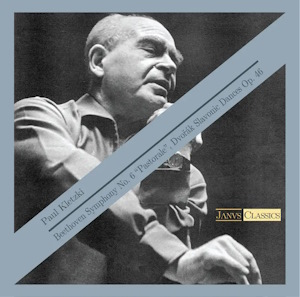
Ludwig van Beethoven (1770-1827)
Symphony No. 6 in F major ‘Pastoral’ (1802-08)
AntonÍn Dvořák (1841-1904)
Slavonic Dances, Op. 46 Nos. 1-3 & 6-8 (1878)
Orchestre national de la RTF/Paul Kletzki
rec. June & July 1961, Paris. Stereo ADD
Janus Classics JACL-3 [69]
This is a further release in the series of Kletzki’s recordings from Janus Classics as part of the “Furtwängler’s Legacy Project”; I refer you to my previous review of their issue of his accounts of Beethoven’s First and Fifth Symphonies for a little more background information regarding the ethos behind it.
According the notes, the remastering of the symphony involved rebalancing of channels, a reduction in the bass frequencies and repairs to damaged tape. The results are impressive: we can hear the transparency of Kletzki’s account, the characteristic graininess of the French woodwind coming through clearly and even the conductor’s breathing; there is little about this recording to suggest its age. Kletzki preserves a light, tripping touch; tempi are brisk without sounding rushed. The lilting opening phrases of the second, ‘Szene am Bach’ (Scene by the Brook) movement sound a little dull and muffled but that is a passing flaw. The country folk frolic at a steadier pace than is the norm in modern performances but the woodwind acquit themselves well and it is all very cheerful and uplifting. The storm benefits from Kletzki’s careful dynamic shading and the full – now apparently tamed – bass, drums and double basses coming through nicely. Finally, Beethoven’s orchestral, programmatic foreshadowing of the “Heiliger Dankgesang” of Op. 132 from two decades later emerges as warm and consolatory; nothing about this performance jars.
The Pastoral is above all a rural, bucolic, songful, symphony – hence the coupling is apt. The original LP release of the Slavonic Dances contained these six dances from the first set and three from the second. We have only the former here; numbers four and five from Opus 46 were not recorded and it’s a pity that we cannot have the full set of eight but we have nearly half an hour of the most engaging and uplifting music Dvořák ever wrote. Again, according the notes, some of them were released on CD 34 years ago but were poorly transferred without remedying several sonic flaws, especially imbalances between right and left channels; they certainly sound good now, despite an element of “shriekiness” in the upper strings – which is, in any case, not entirely out of place in such exuberant music. My touchstone for this music has long been Szell, with Kubelik not far behind, but Kletzki demonstrates that he can stand with such illustrious exponents and seems entirely at home in the idiom; perhaps his Polish origins imbued him with an affinity for Eastern European dance rhythms and you would hardly think he was at the helm of a Parisian orchestra, such is their ease. It swings, whirls and twirls with wild abandon; I particular enjoy the rubato and daring etiolation of rhythms in the Dumka (track 7) and have loved the Skočná ever since I first encountered it in the innovative animated film Allegro no troppo – the Italian equivalent of Fantasia, made by Bruno Bozzetto and released in 1976. The selection might not be complete but Dvořák’s sequencing is still intact, beginning and ending in the cumulative frenzy of the Furiant.
Those booklet notes continue the high standard set by previous releases: there are excerpts from Wagner’s commentary and thoughts from two of Dvořák’s contemporary champions, reviews of the performances by Qiao Huang, comments regarding the remastering by sound engineer Brian Wang, a biography of the conductor and a history of the orchestra, and photos including reproductions of the original LP covers – a lot of quality information to read, especially considering the paucity of content in some re-issues from other labels.
Is there anything “special” about these performances? Not exactly – but the symphony is “juste comme il faut” and the Dvořák pieces in particular are as delightful as any I know; both are wholly satisfying. They make a fine tribute to a conductor whose profile is not nowadays as high as it might be.
Ralph Moore
Buying this recording via a link below generates revenue for MWI, which helps the site remain free


















